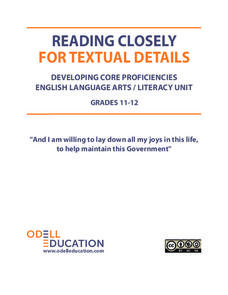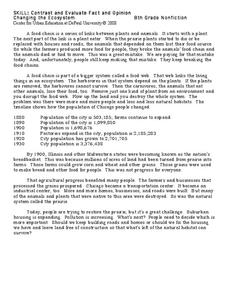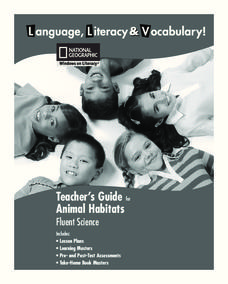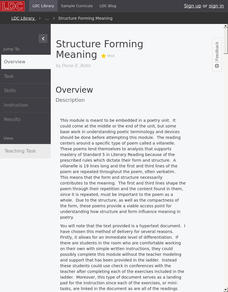K5 Learning
A Response to 9-1-1
When you get hurt, who are the people who help you? Learn about first responders, support services, and public health with a reading passage. Kids read the informational text and answer reading comprehension questions about the...
Odell Education
Reading Closely for Textual Details: "And I am willing to lay down all my joys in this life..."
Look closely, some details are hidden! Scholars learn how to find attributes by first examining characteristics in illustrations and then move to locating details in text with close reading. The teacher models good practices for...
K12 Reader
Classifying Triangles
Bring math and reading informational text together with a reading comprehension lesson. After kids read about isosceles, scalene, and equilateral triangles, they answer five comprehension questions to demonstrate how they can use context...
Curated OER
Hot Spots
Keep an eye on progress with reading and vocabulary using pink and green sticky notes. This resource describes how to set up the sticky note system so that learners can note difficult passages, and teachers can track ability.
Odell Education
Reading Closely for Textual Details: "We, as a people, will get to the promised land!"
Take another look—there are probably more details than readers realize. Scholars analyze nine texts in a five-part unit that contains 21 activities to find textual details. Activities include close reading, independent reading,...
EngageNY
Gathering Information about Water Management: Assessing and Reading Internet Sources, Day 3
Water is life! Using the informative resource, scholars first read two informational articles about water management in agriculture. Then, they use a Venn diagram to contrast the different types of evidence authors use to support a...
Curated OER
Simple Preparation Can Improve Reading Comprehension
Reading comprehension is key to success in nearly every subject in school, but how do you improve comprehension in a pupil with dyslexia? Here are several tips that define ways in which educators can provide strategies to improve overall...
DePaul University
Contrast and Evaluate Fact and Opinion
How can you tell when an author is expression an opinion or stating a fact? Use two short reading selections to emphasize the difference between a statement that you can prove and one that you can't. The first passage explains food...
Curated OER
8th Grade Reading Comprehension Success
Augment your eighth grade language arts curriculum with a thorough set of reading comprehension activities and assessments. Focusing on a variety of skills, including vocabulary in context, text structure, main idea, and author's style,...
EngageNY
Reading for Gist and Answering Text-Dependent Questions: Local Sustainable Food Chain
Readers use sticky notes and a Reading Closely: Guiding Questions handout to record the gist of a different section (pages 161-166) in The Omnivore’s Dilemma. They then pair up and share their ideas. To end the lesson, readers complete...
EngageNY
Organizing an Opinion, Reasons, and Evidence: Text 2 for Each Expert Group
The proof is in the reading. Using the informative resource, scholars read a second article about either Althea Gibson or Roberto Clemente. As they read, they continue adding reasons and evidence to their graphic organizers to show how...
Curated OER
Reading Comprehension: Obesity and Food Deserts
Read this selection about "food deserts," places where high poverty rates limit access to healthy foods with your class. Six multiple choice questions on comprehension, inferences, vocabulary, and citing the text follow the selection and...
Teach-nology
Author’s Purpose: Inform
Why does an author write an informative article? Learners examine passages of a short reading on Spain and determine what the author wanted to inform the reader about.
EngageNY
Reading to Determine Important Relationships between People and Events: The Importance of the 1936 Olympics for African Americans (Promises to Keep, Pages 16–19)
Scholars look at cause-and-effect relationships while doing a close read of the 1936 Olympics on pages 16-19 of Promises to Keep. They complete a cause-and-effect note catcher and add their ideas to an anchor chart. Readers then work...
National Geographic
Animal Habitats
Explore animal habitats and reinforce speaking, listening, reading comprehension, and writing skills with a unit that focuses on the Arctic, desert, ocean, prairie, and rainforest. Enthusiastic scientists read informational text to...
Literacy Design Collaborative
Structure Forming Meaning
Teach literary lovers how to form opinions about form. Scholars read
informational text about the form used in villanelles. After analyzing
the structure used in the poetry with graphic organizers and gallery
walks, writers create...
Germantown School District
Close Reading World Religions: Islam
As part of a close reading activity, individuals respond to three questions and craft two short essays based on a passage about Islam, one of the world most widespread religion.
Core Knowledge Foundation
Taking Care of the Earth Tell It Again!™ Read-Aloud Anthology
A read-aloud anthology closely examines human impact on the Earth while boosting reading comprehension skills. Through stories, scholars examine the concepts of natural resources, pollution, garbage, and recycling and brainstorm ways to...
Curated OER
The Internet of Things: IoT
How has the Internet of Things affected our lives? Scholars examine the massive influence of mobile devices in this analysis lesson, which begins with a seven-minute documentary clip. They also read a New York Times article (linked)...
Core Knowledge Foundation
Early World Civilizations Tell It Again!™ Read-Aloud Anthology
Ancient world civilizations are the focus of a read-aloud anthology. First graders explore the early world of Mesopotamia, Babylon, the sphinx, and pyramids, get to know people of the Nile, Hatshepsut, and Tutankhamun, and examine world...
Core Knowledge Foundation
Light and Sound Tell It Again!™ Read-Aloud Anthology
Light and sound are the running themes of a read-aloud anthology. Over three weeks, third graders listen to discuss readings in preparation for completing extension activities. Pupils work through the writing process to compose an...
Core Knowledge Foundation
Animals and Habitats Tell It Again!™ Read-Aloud Anthology
A read-aloud anthology explores various habitats and the animals that inhabit them, from the Artic to the desert, the forest, and bodies of water. First graders listen to and discuss texts and complete word work. Each lesson offers...
Core Knowledge Foundation
Frontier Explorers Tell It Again!™ Read-Aloud Anthology
The last read-aloud anthology in the series showcases frontier explorers. First graders listen to texts about Daniel Boone, crossing the Appalacian Mountains, Lewis and Clark, dangers on the prairie, and more. After reading, pupils...
Core Knowledge Foundation
The War of 1812 Tell It Again!™ Read-Aloud Anthology
A read-aloud anthology consists of eight lessons about the War of 1812. Over 12 days, pupils listen to and discuss readings, practice word work, then complete extension opportunities designed for the class and home. Assessments gauge...

























